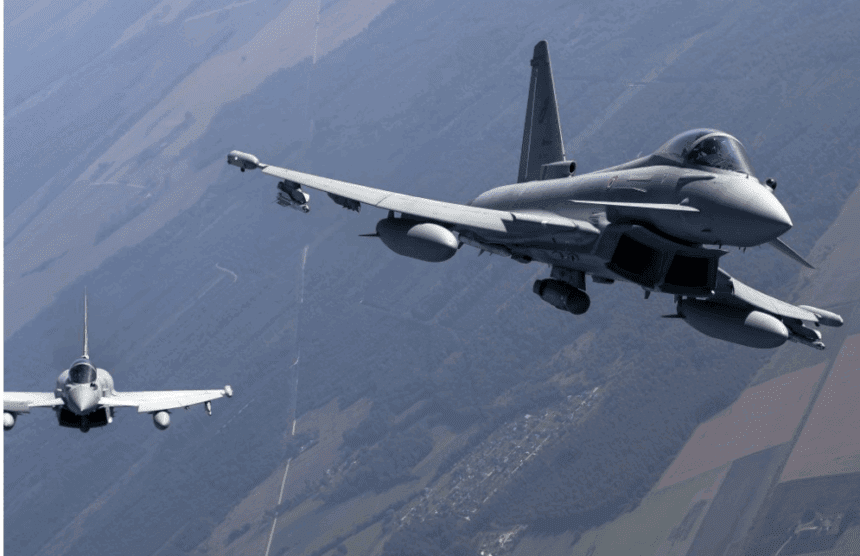Turkey moved a step closer to acquiring Eurofighter Typhoon jets on Wednesday, as Germany officially approved the long-delayed export license and the United Kingdom signed a memorandum of understanding (MoU) with Ankara, paving the way for the country’s entry into the Eurofighter operator group.
The breakthrough follows years of protracted negotiations and diplomatic maneuvering. According to reports from Agence France-Presse and Reuters, German government spokesman Stefan Kornelius confirmed that Berlin had sent written approval to Ankara authorizing the export of the advanced multirole fighters. Germany’s decision removes the final political obstacle to the deal, which requires unanimous consent from all four Eurofighter partner nations—Germany, the United Kingdom, Italy, and Spain.
UK Leads Negotiations Amid Strategic Reengagement
Turkey has long expressed interest in purchasing 40 Eurofighter Typhoons to modernize its air force amid growing regional security challenges. The jets are produced by a multinational consortium represented by Airbus (Germany and Spain), BAE Systems (United Kingdom), and Leonardo (Italy), with final assembly expected to take place in the UK. British leadership in the negotiations has been crucial to sustaining momentum behind the deal.
According to Der Spiegel, the German government, led by Chancellor Friedrich Merz, relented under sustained diplomatic pressure from British Prime Minister Keir Starmer. The publication noted that the project is anticipated to support approximately 20,000 jobs in the UK defense sector, bolstering both industrial cooperation and bilateral ties between London and Ankara.
Shortly after Berlin’s approval was confirmed, Turkish Defense Minister Yaşar Güler and UK Defense Secretary John Healey formalized the political commitment by signing an MoU on the sidelines of the International Defence Industry Fair (IDEF 25) in Istanbul.
Turkish officials stated that pricing and technical specifications are still under negotiation, noting that a counter-proposal is expected following an initial offer.
NATO Ties and Industrial Cooperation
The Turkish Ministry of National Defense welcomed the agreement as a strategic milestone in strengthening the “decades-long friendship between key NATO allies” and reinforcing Turkey’s long-term air combat capabilities. In a separate statement, Secretary Healey emphasized the deal’s dual benefit—enhancing NATO’s collective defense posture while also “securing thousands of skilled jobs across the UK for years to come.”
The Eurofighter Typhoon is a highly versatile, twin-engine, multirole combat aircraft designed for both air superiority and ground attack missions. It is currently operated by several NATO members and allied countries, making it a symbol of strategic interoperability within the alliance.
Post-F-35 Realignment
Turkey’s pursuit of the Eurofighter Typhoon comes in the wake of its expulsion from the U.S.-led F-35 Joint Strike Fighter program in 2019. The U.S. decision followed Ankara’s controversial procurement of the Russian-made S-400 missile defense system, which Washington said compromised the security architecture of the stealth fighter program. As a result, Turkey has sought alternative options to upgrade its air fleet and reassert its role within NATO’s military framework.
In addition to the Eurofighter, Turkey is simultaneously developing its own fifth-generation fighter jet, the KAAN, which is scheduled to become operational by 2028. While the domestic platform aims to enhance national defense autonomy in the long term, the Eurofighter acquisition offers an immediate solution to bridge capability gaps in the Turkish Air Force.
Broader Implications
Germany’s reversal is seen as a significant geopolitical gesture that may improve strained relations between Berlin and Ankara, which have been at odds over issues ranging from regional interventions to domestic human rights concerns. The move also reflects growing European interest in stabilizing ties with Turkey, a key NATO member with a pivotal role in the alliance’s southern flank.
While no final contract has yet been signed, all signs point to the deal moving forward. However, Turkish officials have not ruled out the possibility of pivoting away from the Eurofighter if Ankara is promised a path back into the U.S.-led F-35 program. Some observers suggest Turkey may be using the Eurofighter negotiations as a strategic bargaining chip to pressure Washington into reaccepting it into the fifth-generation fighter initiative.



